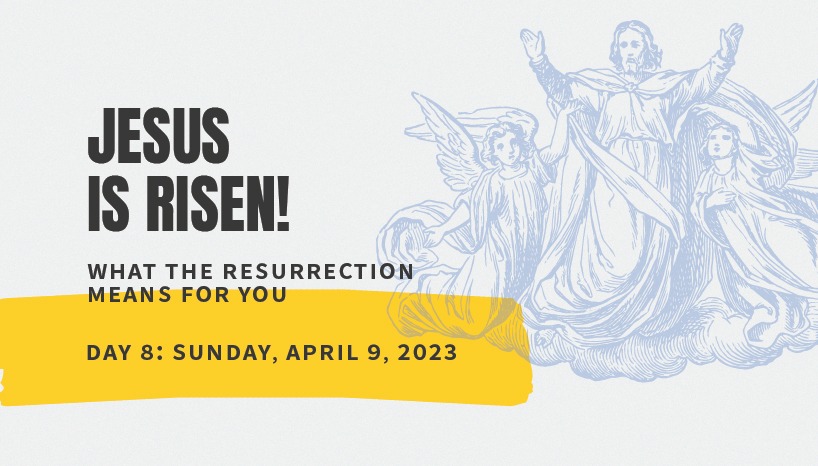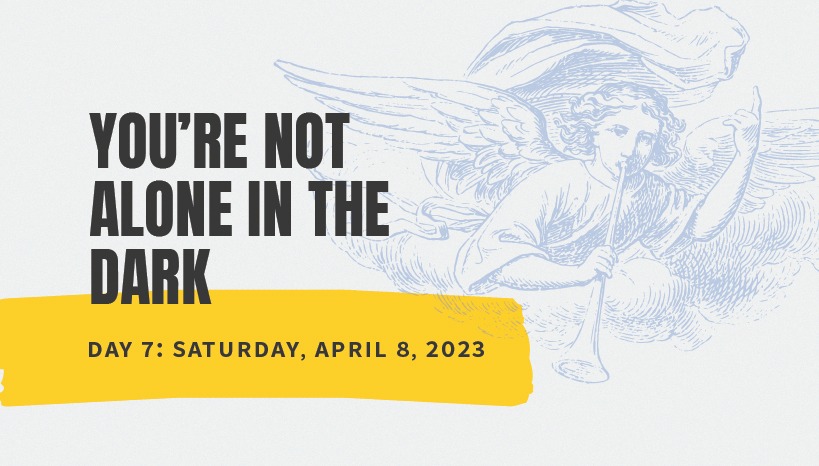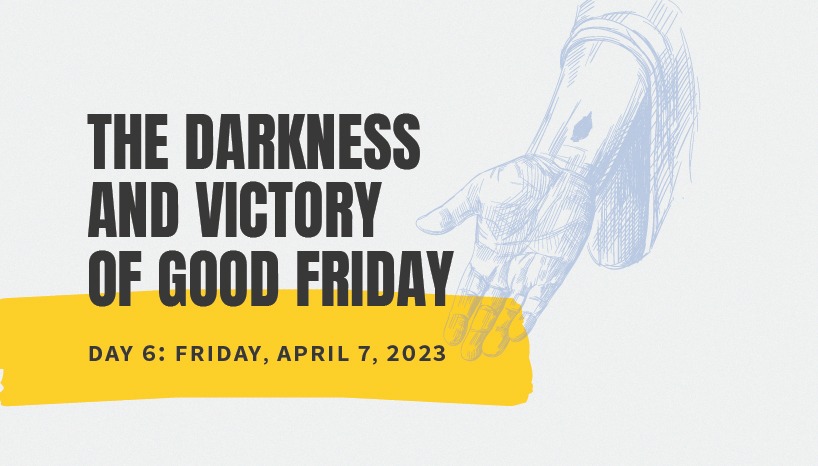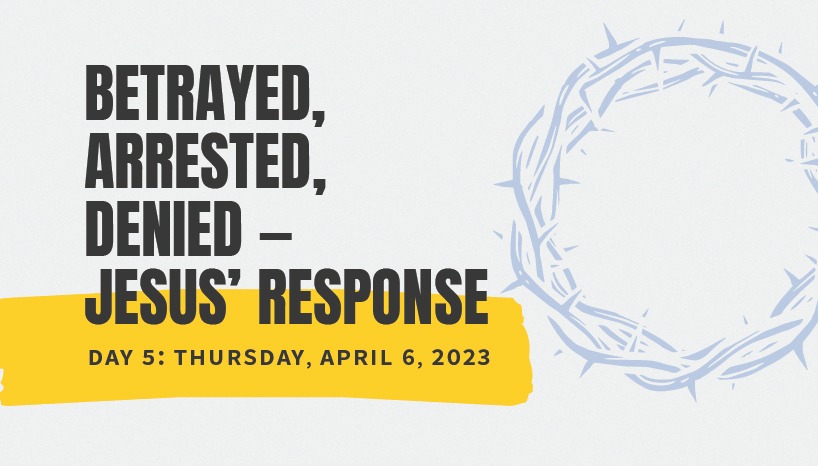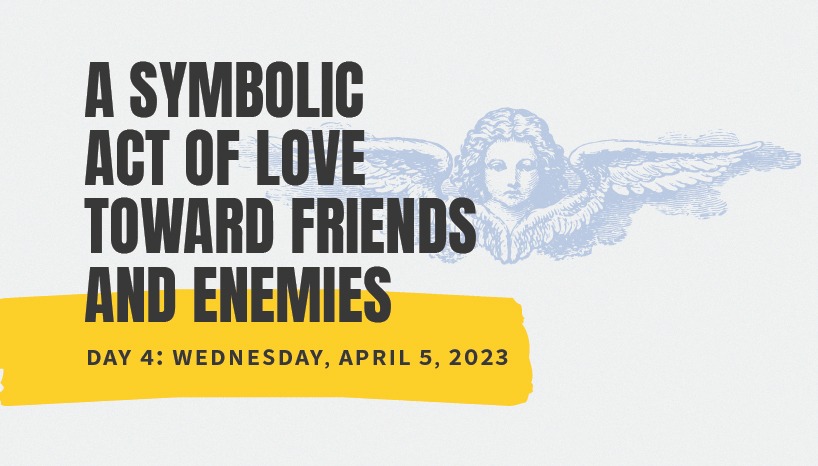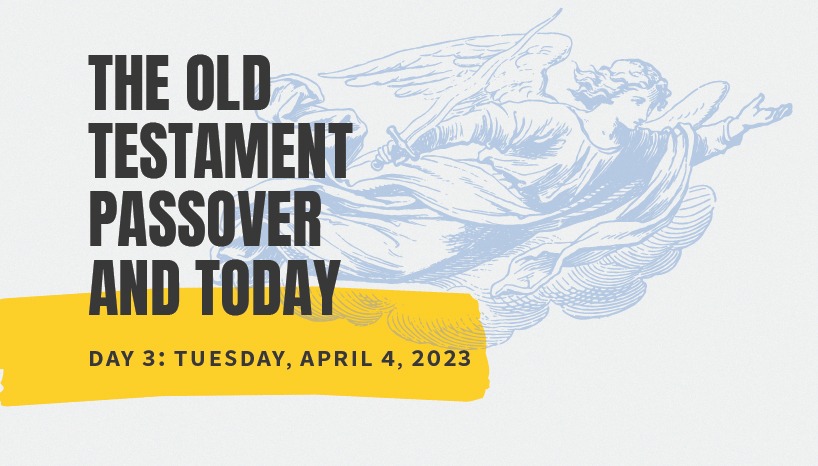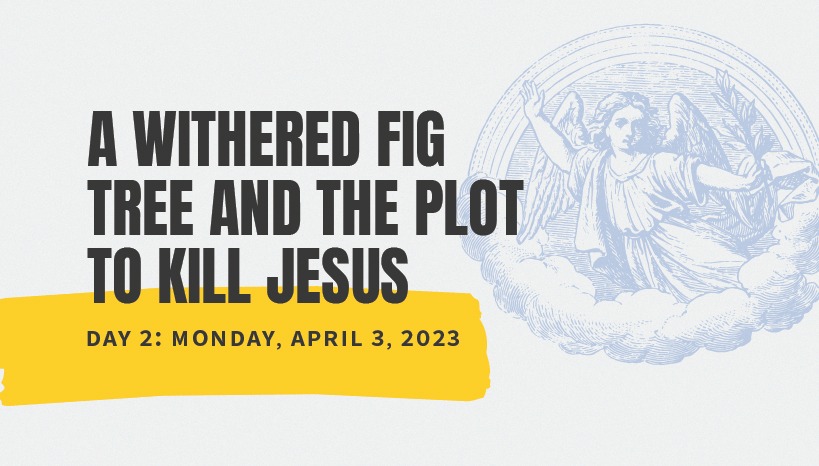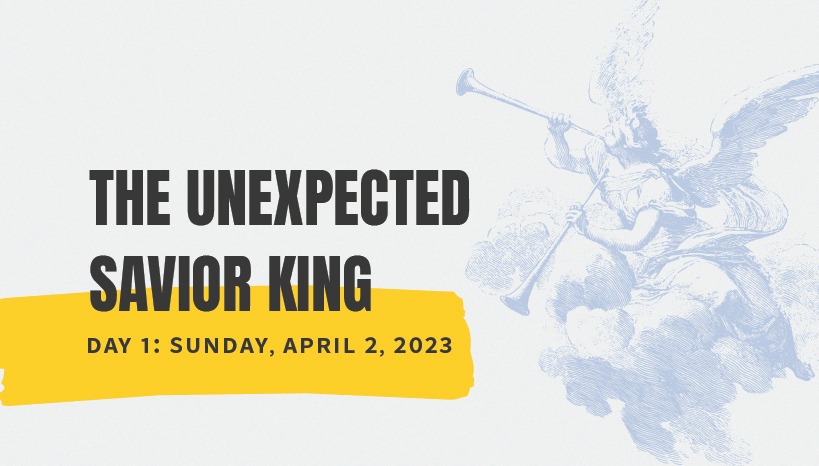Day 8 – Jesus is Risen!
Today’s Reading: John 20, NLT
Early on Sunday morning, while it was still dark, Mary Magdalene came to the tomb and found that the stone had been rolled away from the entrance. She ran and found Simon Peter and the other disciple, the one whom Jesus loved. She said, “They have taken the Lord’s body out of the tomb, and we don’t know where they have put him!”
Peter and the other disciple started out for the tomb. They were both running, but the other disciple outran Peter and reached the tomb first. He stooped and looked in and saw the linen wrappings lying there, but he didn’t go in. Then Simon Peter arrived and went inside. He also noticed the linen wrappings lying there, while the cloth that had covered Jesus’ head was folded up and lying apart from the other wrappings. Then the disciple who had reached the tomb first also went in, and he saw and believed— for until then they still hadn’t understood the Scriptures that said Jesus must rise from the dead. Then they went home.
Mary was standing outside the tomb crying, and as she wept, she stooped and looked in. She saw two white-robed angels, one sitting at the head and the other at the foot of the place where the body of Jesus had been lying. “Dear woman, why are you crying?” the angels asked her.
“Because they have taken away my Lord,” she replied, “and I don’t know where they have put him.”
She turned to leave and saw someone standing there. It was Jesus, but she didn’t recognize him. “Dear woman, why are you crying?” Jesus asked her. “Who are you looking for?”
She thought he was the gardener. “Sir,” she said, “if you have taken him away, tell me where you have put him, and I will go and get him.”
“Mary!” Jesus said.
She turned to him and cried out, “Rabboni!” (which is Hebrew for “Teacher”).
“Don’t cling to me,” Jesus said, “for I haven’t yet ascended to the Father. But go find my brothers and tell them, ‘I am ascending to my Father and your Father, to my God and your God.’”
Mary Magdalene found the disciples and told them, “I have seen the Lord!” Then she gave them his message.
That Sunday evening the disciples were meeting behind locked doors because they were afraid of the Jewish leaders. Suddenly, Jesus was standing there among them! “Peace be with you,” he said. As he spoke, he showed them the wounds in his hands and his side. They were filled with joy when they saw the Lord! Again he said, “Peace be with you. As the Father has sent me, so I am sending you.” Then he breathed on them and said, “Receive the Holy Spirit. If you forgive anyone’s sins, they are forgiven. If you do not forgive them, they are not forgiven.”
One of the twelve disciples, Thomas (nicknamed the Twin), was not with the others when Jesus came. They told him, “We have seen the Lord!”
But he replied, “I won’t believe it unless I see the nail wounds in his hands, put my fingers into them, and place my hand into the wound in his side.”
Eight days later the disciples were together again, and this time Thomas was with them. The doors were locked; but suddenly, as before, Jesus was standing among them. “Peace be with you,” he said. Then he said to Thomas, “Put your finger here, and look at my hands. Put your hand into the wound in my side. Don’t be faithless any longer. Believe!”
“My Lord and my God!” Thomas exclaimed.
Then Jesus told him, “You believe because you have seen me. Blessed are those who believe without seeing me.”
The disciples saw Jesus do many other miraculous signs in addition to the ones recorded in this book. But these are written so that you may continue to believe that Jesus is the Messiah, the Son of God, and that by believing in him you will have life by the power of his name.
He is risen!
The humble, servant king has conquered sin and death. He is alive.
For a unique period of human history, Jesus — God in human flesh — dwelt among us as a man. Being eternally God, when He came to earth, He became fully human as well. Because He is both God and man, He can be in heaven seated at the right hand of the Father and also dwells within each Christian through the Holy Spirit (Ephesians 1:13-14).
Jesus is rightly called Immanuel, “God with us” (Matthew 1:23).
He took on flesh to live with us, die for us and be raised from the dead.
His presence, power and authority are not merely confined to upper rooms, open fields or sandy seasides. Jesus is in every home, workplace and recreational space as He accompanies His faithful followers into all spheres of life. If you have trusted Jesus to forgive your sins and chosen to follow Him, He promises to be with you (Ephesians 1:13-14).
As a follower of Jesus, you can have confidence through His resurrection that your sins are forgiven. Everything Jesus promised in His teachings you can trust to be true. You are a child of God, and you will live forever with Him.
As you continually entrust your life to Jesus and follow Him, your life on earth will be transformed. Jesus promised that the result of a close relationship with Him is “love, joy, peace, patience, kindness, goodness, faithfulness, gentleness, and self-control” (Galatians 5:22-23, New Living Translation). These traits that He exhibits through you enable you to be an inviting and effective ambassador of His wherever you go.
Jesus has been raised from the dead, and He is with you always (Matthew 28:20)!
Reflect and Respond
Read 1 Corinthians 15:14-20.
And if Christ has not been raised, then all our preaching is useless, and your faith is useless. And we apostles would all be lying about God—for we have said that God raised Christ from the grave. But that can’t be true if there is no resurrection of the dead. And if there is no resurrection of the dead, then Christ has not been raised. And if Christ has not been raised, then your faith is useless and you are still guilty of your sins. In that case, all who have died believing in Christ are lost! And if our hope in Christ is only for this life, we are more to be pitied than anyone in the world.
But in fact, Christ has been raised from the dead.
Jesus, thank You that You have conquered sin and death, that You have paid for my sins, and that because of You, my faith is not useless. Thank You that You have power over the grave and You are the forever-reigning king of kings. Thank You that Your resurrection has provided the way for me to have new life now and for eternity. I rejoice in Your amazing grace, which promises that You are with me and will never leave me. Jesus, make me into the person You want me to be, and give me the faith to trust You. Show me how I experience a life closer to You.
